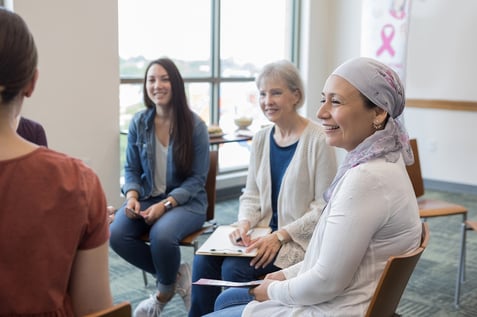Living Longer with Cancer Reveals Need for Comprehensive Follow-Up Cancer Care
4 min read

Recently, Rocky Mountain Cancer Centers (RMCC) published a blog about Kathy Nafie, a patient who has lived for nine years with advanced, metastasized melanoma and receives comprehensive follow-up cancer care at RMCC.
“You say ‘cancer’ and everyone assumes you’re going to die,” Kathy said. “When I tell people what kind of cancer I have, the response is either a gasp or a story about a loved one who died of this cancer. You need to have a deaf ear.”
While having a deaf ear and reading some of Kathy’s other lessons in long-term cancer survival will be helpful for many patients with incurable cancer, we need to conceptually expand our understanding of cancer beyond the diagnosis and immediate treatment of the disease.
Before an intimate experience with a cancer diagnosis and treatment, many people think of cancer as either “curable” or “fatal.” But, cancer, it turns out, is more nuanced than either surviving or dying. As cancer treatments advance, many patients are living longer, even with incurable cancers, and this brings a range of long-term considerations and challenges that, earlier in the history of the disease, no one knew to expect.
Meanwhile, even patients with curable forms of cancer often find themselves dealing with new and unfamiliar issues after being “cured.” RMCC recognizes that cancer treatment doesn’t end when treatment ends – and for people with chronic disease, it never ends. Our understanding of what long-term cancer survival looks like and what’s necessary for comprehensive follow-up cancer care is evolving along with the medical advancements that make longer survival possible.
Long-term Issues Requiring Comprehensive Follow-up Cancer Care
Checkups and Tests for Recurrence
The comprehensive follow-up cancer care most patients are familiar with is the follow-up tests necessary to check for evidence of cancer and monitor its growth. For certain kinds of cancers, these tests will continue over a set period of time before concluding. For other types of cancers, patients will continue to be monitored throughout their entire life.
The type and frequency of follow-up cancer testing differs depending on the patient and the type of cancer they face. Cancer screening tests can include PET scans, CT scans, mammograms, and blood tests and can be required anywhere from once a month to once every year or two after completing cancer treatment, depending on how aggressive cancer growth has been. RMCC oncologists work with individual patients to set a testing schedule that balances the need for vigilance with the desire to move beyond a life that revolves around doctors’ appointments.
Supporting Mental and Emotional Health
“Treating mental health is not just about making people feel more positive, but limiting the side effects of chemotherapy, reducing pain, lessening fatigue, and in some studies, reducing the risk of cancer recurrence,” writes Dr. Marlena Ryba in her article A Cognitive Approach to Cancer Treatment.
 At RMCC, supporting the mental health of cancer patients can take many forms, from peer support groups to meeting with cancer social workers, to connecting patients with outside resources like cognitive therapy.
At RMCC, supporting the mental health of cancer patients can take many forms, from peer support groups to meeting with cancer social workers, to connecting patients with outside resources like cognitive therapy.
“Fighting cancer is all about attitude,” said Kathy Nafie, who has lived nine years with what’s considered fatal cancer. “You have to keep your head above it.”
Because knowledge is power, RMCC provides patients with opportunities for ongoing education about cancer and treatment, hosting informative live events and webinars. RMCC also provides informative resources on numerous non-medical subjects, such as Advance Care Planning or talking to kids about cancer.
Additionally, many cancer patients have questions about emotional or lifestyle changes caused by cancer treatment. These are things like sex and cancer, finding good books about cancer, how to eat healthy, and coping with loss.
Treatment of Accompanying Issues
Very few people emerge from cancer treatment with their bodies unchanged. Breast cancer patients who undergo mastectomies will need to decide whether to have breast reconstruction or forgo it.
Patients with other types of cancer find their bodies altered in different ways – and need to learn ways to accommodate those changes. For example, Mark Hoshall, an RMCC patient who is now cancer-free after nine years, had extensive surgery in his colon and rectum and has a permanent colostomy. He has made lifestyle and work modifications to make continued work possible despite this condition.
Certain types of chemotherapy have the potential to cause long-term damage to other parts of the body and these will need to be monitored even if cancer treatment ends. For example, RMCC Advanced Practice Provider Katherine Albert works to ensure chemo patients who are at risk of cardiac toxicity receive long-term monitoring following their cancer treatment.
Realistic Expectations, Resilience, and the Tools to Deal with Anything That Arises
“So many people finish treatment and are like ‘OK, I’m done with cancer, done with treatment, back to work.’ But they don’t have tools and resources to get back to normal life,” said Dr. Deborah Butzbach, an oncologist, cancer life coach, and creator of the Best Life After Cancer podcast.
RMCC aims to provide ongoing support for cancer survivors throughout their cancer journey, including after treatment ends and during long-term treatment of chronic disease. Part of providing comprehensive follow-up cancer care is addressing issues like Adapting to a New Normal at Work and Managing Post-Treatment Side Effects.
Living longer with cancer – or outliving cancer completely – is a blessing, but that doesn’t mean life will immediately return to normal. In fact, most cancer survivors find their lives will always be different than before diagnosis. But with resilience, emotional support, helpful information, and resources from RMCC, a “new normal” is possible.